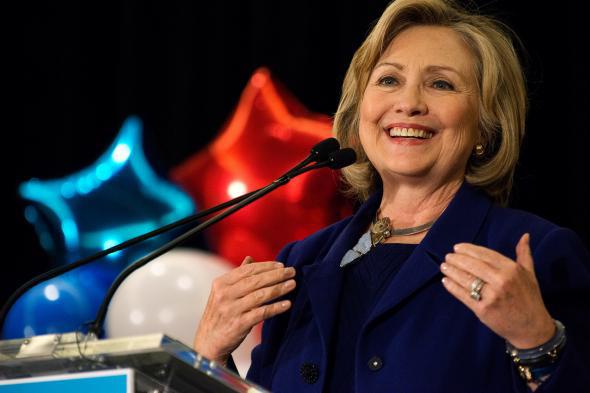The first speech of a presidential campaign is loaded with meaning, an opportunity to set the campaign’s entire tone and outline its major themes. Barack Obama kicked off his 2008 campaign in Springfield, Illinois, to invoke the legacy of Abraham Lincoln and a larger theme of calling on a “divided house to stand together.” In contrast, Ronald Reagan kicked off his 1980 campaign at the Neshoba County Fair in Mississippi, near the site where three civil rights workers had been murdered 16 years before, to make a speech about “states’ rights” and secure the Republican stronghold over the Southern white vote that persists to this day.
Hillary Clinton announced her campaign online, but her first meatspace speech was held Thursday at the Women in the World Summit in New York City, an annual feminist shindig that’s all about improving women’s fortunes around the world. The choice of the location in itself sends a strong signal, and if there was any doubt that Clinton intends to run a woman-centric campaign, her speech erased it. “When women are held back, our country is held back. When women get ahead, everyone gets ahead,” she declared.
The idea that uplifting women uplifts the nation has become standard fare in Democratic speech-making. For instance, in Obama’s 2014 speech on equal pay, he said, “And part of that is fighting for fair pay for women—because when women succeed, America succeeds.” When women make less money, he said, that’s “less money for gas, less money for groceries, less money for child care, less money for college tuition, less money is going into retirement savings.”
Clinton took this rhetoric to a bolder level. For one thing, she actually used the word feminist. “It is hard to believe that in 2015 so many women still pay a price for being mothers. It is also hard to believe that so many women are also paid less than many for the same work, with even wider gaps for women of color,” she said. “And if you don’t believe what I say, look to the World Economic Forum, hardly a hotbed of feminist thought. Their rankings show that the United States is 65th out of 142 nations and other territories on equal pay.”
She tied together other explicitly feminist issues, such as reproductive rights and the fight against sexual assault to the family-friendly equal-pay agenda. “There are those who offer themselves as leaders who see nothing wrong with denying women equal pay,” she argued in a shot against Republicans. “There are those who offer themselves as leaders who would defund the country’s leading provider of family planning and want to let health insurance companies once again charge women just because of our gender.” Clinton invoked the recent fight over the appointment of Loretta Lynch as attorney general: Republicans weren’t explicitly sexist to Lynch, but her appointment was held up over an ugly fight over Republicans trying to attach anti-abortion provisions to every bill they possibly can.
The political chatter is centered around how Clinton isn’t downplaying her gender, as she did in 2008, but holding it up as an asset. This speech suggests she is running an aggressively feminist campaign. It’s a smart move. Her opposition is going to try to paint her as a ball-busting “feminazi” no matter what she does, so she might as well get ahead of them, openly embracing feminism, sharing a vision of feminism that is optimistic and pro-family. Luckily, she has a more accurate vision of what feminism is really about than her detractors do.
